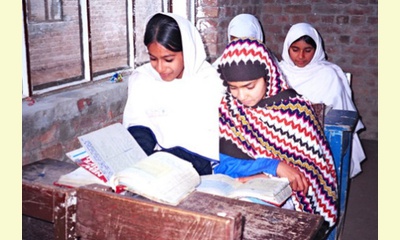|
|
In education, girls deserve what works
un article par Stephanie Psaki, Devex (abridged)
Ranging from viral celebrity videos by Alicia Keys or Susan
Sarandon to declarations of support from political leaders like
Michelle Obama or Graça Michel, there’s definitely a global
momentum for supporting girls’ education. 
Council researchers studied the implications of changes in schooling opportunities in rural Pakistan and their implications for family building as well as children’s school participation and attainment. Photo by: Population Council
click on photo to enlarge
This widespread attention has led to greater recognition of the
importance of the issue, as well as the dividends it can reap.
Globally, girls who attend school during adolescence begin
having sex, marry and have children later, are less likely to get
HIV or have other reproductive health problems, engage in
fewer hours of domestic labor, and experience greater gender
equality.
Despite all these potential gains, 17 countries — 13 of them
in Africa — still have fewer than 90 girls enrolled in primary
school for every 100 boys. When girls (and boys) do attend
school, the quality of schooling in many settings is so poor
that they emerge without basic skills. Equally concerning,
preliminary evidence from the Population Council’s research in
Malawi shows that after leaving school, girls are significantly
more likely to lose both reading and numerical skills than
boys.
See more news on girls’ education:
● For Nigerian girls, education is the key that
opens doors to progress
● How to empower the girl
child
● It's time to unleash girls'
potential
More work is needed to translate schooling into lifelong
success for girls in developing countries. To date, very little
attention has been paid to investigating what kinds of
investments have an impact on girls — what specific programs
or actions are effective in keeping girls in school, helping
them learn, and empowering them to transition to healthy and
productive lives after leaving school.
In fact, research is so limited that, in a pivotal publication
about the state of girls’ education, Our researcher Cynthia
Lloyd found that girls’ education interventions fell into 12
main categories. Out of those, only two — hiring female
teachers and scholarships and cash transfers — had been
proven effective. The remaining ten approaches, while
promising, were not supported by evidence despite
widespread adoption.
We often hear the phrase, “We know what works; we just have
to do it.” And the value of insight and intuition gained through
work with girls and in their communities can’t be overstated.
But interventions that are popular and appear to have a
positive effect in the short-term, while often valuable for
other reasons, do not always have the impact we’re expecting
in the long-term. What works for one girl might not work for
all—or even most—girls. And what works in one location
might not work in another. . .
As this global movement evolves, donors and organizations
that work with and on behalf of girls should demand a higher
standard of evidence to guide our efforts. Investments should
be focused on programs that have been demonstrated to be
effective in achieving clearly stated goals, or on evaluating
promising interventions that lack sufficient evidence to date.
Girls around the world deserve no less.
[Thank you to Janet Hudgins, the CPNN reporter for this
article.]
|








|
DISCUSSION
Question(s) liée(s) à cet article:
Gender equality in education, Is it advancing?
* * * * *
Commentaire le plus récent:
Re: Gender equality in education: is it advancing
Considering that the first women to somehow get into universities was in the 19th C, we are making tortoise-like progress. Although there are more women than men in most schools now they tend toward the Arts where they are scorned by men in science. That's the kind of thing that was passed around 60 - 70 years ago but it's still here today. But, there is a trend that will make a difference quite soon: the majority of regional politicians are women who are Arts grads and they are going to shift the weight of policy to domestic from global. That will mean less war, more peace, more freedom and better education for women.

|
|









